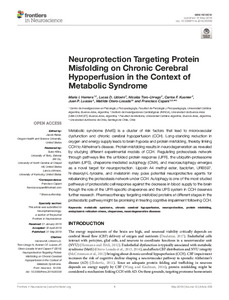Please use this identifier to cite or link to this item:
https://repositorio.uca.edu.ar/handle/123456789/6169| Título: | Neuroprotection targeting protein misfolding on chronic cerebral hypoperfusion in the context of metabolic syndrome | Autor: | Herrera, María Inés Udovin, Lucas Daniel Toro-Urrego, Nicolás Kusnier, Carlos Federico Luaces, Juan P. Otero Losada, Matilde Capani, Francisco |
Palabras clave: | SINDROME METABOLICO; CEREBRO; PROTEINAS; ENFERMEDADES NEURODEGENERATIVAS | Fecha de publicación: | 2018 | Editorial: | Frontiers Media | Cita: | Herrera, M. I., Udovin, L. D., Toro-Urrego, N., Kusnier, C. F., Luaces, J. P., Otero-Losada, M. y Capani, F. (2018). Neuroprotection targeting protein misfolding on chronic cerebral hypoperfusion in the context of metabolic syndrome [en línea] Frontiers in Neuroscience, 12:339. doi: 10.3389/fnins.2018.00339 Disponible en: https://repositorio.uca.edu.ar/handle/123456789/6169 | Resumen: | Abstract: Metabolic syndrome (MetS) is a cluster of risk factors that lead to microvasculardysfunction and chronic cerebral hypoperfusion (CCH). Long-standing reduction inoxygen and energy supply leads to brain hypoxia and protein misfolding, thereby linkingCCH to Alzheimer’s disease. Protein misfolding results in neurodegeneration as revealedby studying different experimental models of CCH. Regulating proteostasis networkthrough pathways like the unfolded protein response (UPR),the ubiquitin-proteasomesystem (UPS), chaperone-mediated autophagy (CMA), and macroautophagy emergesas a novel target for neuroprotection. Lipoxin A4 methyl ester, baclofen, URB597,N-stearoyl-L-tyrosine, and melatonin may pose potential neuroprotective agents forrebalancing the proteostasis network under CCH. Autophagyis one of the most studiedpathways of proteostatic cell response against the decrease in blood supply to the brainthough the role of the UPR-specific chaperones and the UPS system in CCH deservesfurther research. Pharmacotherapy targeting misfolded proteins at different stages in theproteostatic pathway might be promising in treating cognitive impairment following CCH. | URI: | https://repositorio.uca.edu.ar/handle/123456789/6169 | ISSN: | 1662-453X | Disciplina: | PSICOLOGIA | Derechos: | Acceso Abierto | Fuente: | Frontiers in Neuroscience, 12:339, 2018 |
| Appears in Collections: | Artículos |
Files in This Item:
| File | Description | Size | Format | |
|---|---|---|---|---|
| neuroprotection.pdf | 761,18 kB | Adobe PDF |  View/Open |
Page view(s)
157
checked on Apr 27, 2024
Download(s)
82
checked on Apr 27, 2024
Google ScholarTM
Check
This item is licensed under a Creative Commons License

